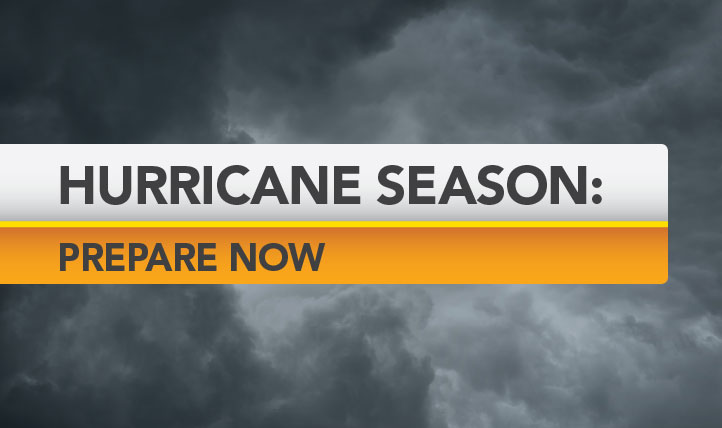
Hurricane season is June 1 – Nov. 30, and forecasters are predicting tropical activity to be a little above average this year, so it pays to be prepared. The effects of a hurricane can be felt far inland, and if you’re near the coast, one strong storm coming through your area could spell disaster.
Thankfully, weather satellites and nearly 150 years of data allow experts to watch and predict the potential paths of a storm. Unlike a tornado, you will know a hurricane is headed your way a few days before it reaches your community. While that seems like a lot of time to gather essentials, others may be doing the same thing. The best course of action is to prepare before a storm is on its way.
There are a lot of things to think about and do in the event of a hurricane, and we’ve covered many of them here. Visit www.publix.com/storm for more detailed guides and checklists.
Getting ready
- First, find out if your residence could be in danger of storm surges or storm related flooding. Most insurance policies do not cover flood damage, so consider purchasing flood insurance to replace your home and valuables in the event of a flood.
- Learn your evacuation routes and decide where you will go if you are forced to leave your residence. If you don’t have friends or family outside the storm area, a shelter may be your best option. The American Red Cross has an app that shows open shelters in your area and how many people are in each one.
- Prepare your home for storm season by repairing any potential problems. Don’t assume you are out of danger if you live inland. High winds, tornadoes and flash floods can occur anywhere in the hurricane’s path and cause serious damage.
- Make sure you can easily locate and pack important items in case of emergency. Consider making a hurricane kit or keeping a current list of items you will need to weather the storm.
Things you’ll need
- A three-day supply of water and non-perishable food. Both FEMA and the American Red Cross recommend keeping 1 gallon of water per person, per day on hand. That’s 12 gallons of water for a family of four.
- Important paperwork like your insurance policies, leases or deeds, passports and birth certificates
- A seven-day supply of medications and medical supplies, including eye-glasses, syringes, diabetic supplies or battery back-ups for devices that require power
- A first-aid kit
- Flashlights and batteries
- Basic tools for repairs
- A battery-powered radio
- Personal hygiene items
- A manual can opener
- Baby and/or pet supplies
- Clothing and sturdy shoes
- Cell phones and chargers
- Rain gear, insect repellant and sunscreen
- Books, games or other non-electronic entertainment
- A paper list of important contacts and phone numbers, in case your phone is lost or the battery is dead
- Special items that can’t be replaced like family photographs or other valuables
If a hurricane strikes
- Board up your home before the storm reaches your area, and bring loose items like garbage cans, grills, lawn furniture and bicycles inside.
- Put your refrigerator and freezer on their coldest setting, and avoid opening them. Keeping them closed will help your food last longer if you lose power.
- Make sure your car is full of gas.
- If you evacuate, do not return home until authorities say it’s safe.
- Stay indoors if you remain home or go to a shelter. Don’t go anywhere outside until emergency officials say it’s safe. Even if it seems calm, you may be in the eye of the storm, and the danger has not yet passed.
- Use flashlights instead of candles to prevent accidental fires. You could lose power for a few hours, days or weeks.
- Listen to local radio or TV, and follow any emergency instructions that may be issued.
- Stay away from flood waters. The water may be contaminated with chemicals or sewage, and there could be dangerous insects, snakes or animals in it. Roads and bridges may be washed out. Plus, fast moving water is very strong, and you could get swept away in the current.
After the storm
- Make sure you and your family are safe. Let loved ones know your condition.
- Be aware heavy rain or flooding may occur even after the storm has passed.
- Check your home for any damage, and take photographs of damage that will require an insurance claim.
- Beware of fallen power lines. They may be live and could electrocute you.
- Avoid flooded areas, and do not let children play or swim in flood waters. Just like during the storm, flood waters can hide dangerous objects, animals or bacteria, and moving water — even if it’s not very deep — can carry you away.
- Do not drink or cook with tap water until officials say the water supply is safe.
- Check your refrigerator and freezer. If you think your food has spoiled, throw it out.
- Call our Emergency InfoLine to learn if your work location is open after you, your loved ones and your home are safe and secure. Be sure to let your manager know you’re safe and sound.
Publix Emergency InfoLine: 1-877-PUBLIX1
At Publix, we monitor severe weather conditions for all of our communities, and we have a special hotline to keep you informed during a storm. If a hurricane (or any other severe weather system) is expected to hit your area, call the number above, 24/7, to hear information about your work location.
Our non-human friends
Our pets are part of our family, too, and it’s important to make sure they’re safe in the event of a storm. If you have pets, get them ready for hurricane season by making sure their vaccinations and tags are up to date. Also, consider having them microchipped so they can be returned to you if lost.
If you must evacuate with your pet, be sure to pack their vaccination records, food, food dishes, medications and any other supplies they may need like litter pans, crates or harnesses. Many public shelters cannot accept pets, so plan where you will take them. You may have to find a pet-friendly hotel.
If you must leave your pets at home, lock them inside and make sure they have access to plenty of food and water. Post a note with your name, contact information, and the name and number of your vet in a visible area.
If you have larger agricultural animals or livestock, don’t forget about them! Some animals can be evacuated, so just like house pets, make sure their vaccinations are current, paperwork is on-hand and they have some sort of identification on them like tattoos or microchips. In some cases, releasing the animals into a fenced pasture on high ground may be the safest option. You should research the best way to care for your animals and create an emergency plan for them, as well.


